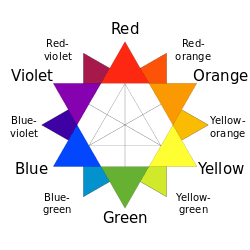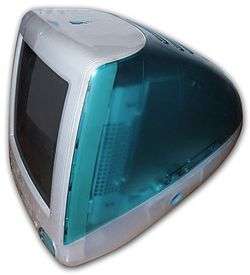Blue-green
| Blue-green | |
|---|---|
| Hex triplet | #0D98BA |
| sRGBB (r, g, b) | (13, 152, 186) |
| CMYKH (c, m, y, k) | (93, 18, 0, 27) |
| HSV (h, s, v) | (192°, 93%, 72[1]%) |
| Source | Crayola |
|
B: Normalized to [0–255] (byte) H: Normalized to [0–100] (hundred) | |

Blue-green is a color that is a representation of the color that is between blue and green on a typical traditional old-fashioned RYB color wheel.
Blue-green belongs to the cyan family of colors.
The source of this color is the List of Crayola crayon colors. Blue-green has been a Crayola crayon color since 1930.
Variations
Cyan (aqua)

| Cyan (Aqua) | |
|---|---|
| Hex triplet | #00FFFF |
| sRGBB (r, g, b) | (0, 255, 255) |
| HSV (h, s, v) | (180°, 100%, 100[2]%) |
| Source | X11 |
|
B: Normalized to [0–255] (byte) | |
Cyan, also called aqua, is the blue-green color that is between blue and green on a modern RGB color wheel.
The modern RGB color wheel replaced the traditional old-fashioned RYB color wheel because it is possible to display much brighter and more saturated colors using the primary and secondary colors of the RGB color wheel. In the terminology of color theory, RGB color space has a much larger color gamut than RYB color space.
The first recorded use of cyan as a color name in English was in 1879.[3]
Turquoise

| Turquoise | |
|---|---|
| Hex triplet | #40E0D0 |
| sRGBB (r, g, b) | (64, 224, 208) |
| CMYKH (c, m, y, k) | (71, 0, 7, 12) |
| HSV (h, s, v) | (174°, 71%, 88[4]%) |
| Source | X11 |
|
B: Normalized to [0–255] (byte) H: Normalized to [0–100] (hundred) | |
At right is displayed the color turquoise, a representation of the color of the semi-precious stone turquoise.
The first recorded use of turquoise as a color name in English was in 1573.[5]
The color "turquoise" is a light tone of blue-green.
Ming
| Ming | |
|---|---|
| Hex triplet | #36747D |
| sRGBB (r, g, b) | (54, 116, 125) |
| CMYKH (c, m, y, k) | (57, 7, 0, 51) |
| HSV (h, s, v) | (188°, 56%, 49%) |
| Source | Xona.com Color List |
|
B: Normalized to [0–255] (byte) H: Normalized to [0–100] (hundred) | |
Displayed at right is the color Ming
This color was formulated in 2001 as one of the colors on the Xona.com Color List.
Pacific blue
| Pacific Blue | |
|---|---|
| Hex triplet | #1CA9C9 |
| sRGBB (r, g, b) | (28, 169, 201) |
| CMYKH (c, m, y, k) | (86, 16, 0, 21) |
| HSV (h, s, v) | (191°, 86%, 79[6]%) |
| Source | Crayola |
|
B: Normalized to [0–255] (byte) H: Normalized to [0–100] (hundred) | |
Displayed at right is the color Pacific blue.
- Pacific blue was formulated as a Crayola color in 1993.
The color is a representation of the waters of the Pacific.
Bondi blue

Bondi blue is a color belonging to the cyan family of blues. It is very similar to the Crayola crayon color blue-green.
Apple christened the color of the exterior of its original iMac G3 personal computer "Bondi blue" when it was introduced in 1998. The color is said to be named for the color of the water at Bondi Beach in Sydney, Australia.
Green-blue
| Green-Blue | |
|---|---|
| Hex triplet | #1164B4 |
| sRGBB (r, g, b) | (17, 100, 180) |
| CMYKH (c, m, y, k) | (91, 44, 0, 29) |
| HSV (h, s, v) | (209°, 90.6%, 70.6[7]%) |
| Source | Crayola |
|
B: Normalized to [0–255] (byte) H: Normalized to [0–100] (hundred) | |
Green-blue had been a Crayola color since 1958. It was continued as a Crayola crayon color until 1990.
Cerulean
Cerulean is a medium blue-green color that is used to represent or symbolize either the sky or the ocean.
The first recorded use of cerulean as a color name in English was in 1590.[8]
Teal
| Teal | |
|---|---|
| Hex triplet | #008080 |
| sRGBB (r, g, b) | (0, 128, 128) |
| HSV (h, s, v) | (180°, 100%, 50[9]%) |
| Source | X11 |
|
B: Normalized to [0–255] (byte) | |
Teal is a medium blue-green color. It is named after the common teal, a member of the duck family, whose eyes are surrounded by the color.
The color teal has a hue that is exactly halfway between blue and green and a value (brightness) that is exactly halfway between white and black.
The first recorded use of teal as a color name in English was in 1917.[10]
In nature
.jpg)
- Bacteria
- Blue-green algae are a phylum of bacteria that obtain their energy through photosynthesis.
- Fish
- The blue green damselfish is a species of damselfish.
- Lakes
- Glacial flour, powdered rock, can turn a lake to a blue-green color.
In human culture
- Engineering
- Blue-Green Engineering is a company that specializes in renewable energy and energy efficiency. The company's head office is located in Sydney Australia.[11]
- Linguistics
- In some languages, blue and green are considered a single color.
- Politics
- In United States politics, the BlueGreen Alliance and its subsidiary the Apollo Alliance is a political movement in which organized labor (blue-collar workers) and environmentalists (greens) are allied with each other to create green jobs by promoting activities such as alternative energy. (See Blue-green alliance#United States)[12]
- Religion
- In the iconography of the Virgin of Guadalupe, she is often depicted as wearing a blue-green colored robe. The color is significant to the Mexicas because in the Aztec religion. Also, Blue-green is known as Maya blue in pre-Columbian cultures. In the Nahuatl culture blue represents the center of fire and tonalli. Also sometimes the blue color is diluted so it appears as a turquoise on manuscripts. The color is often used for the representation of Aztec rulers and European kings.[13]
See also
References
- ↑ web.forret.com Color Conversion Tool set to hex code of color #0D98BA (Blue-Green):
- ↑ web.forret.com Color Conversion Tool set to hex code of color #00FFFF (Cyan (Aqua)):
- ↑ Maerz and Paul A Dictionary of Color New York:1930 McGraw-Hill Page 194
- ↑ web.forret.com Color Conversion Tool set to hex code of color 40E0D0 (Turquoise):
- ↑ Maerz and Paul A Dictionary of Color New York:1930 McGraw-Hill Page 206; Color Sample of Turquoise [green]: Page 73 Plate 25 Color Sample I5
- ↑ web.forret.com Color Conversion Tool set to hex code of color #1CA9C9 (Pacific Blue):
- ↑ web.forret.com Color Conversion Tool set to hex code of color #1164B4 (Green-Blue):
- ↑ Maerz and Paul A Dictionary of Color New York:1930 McGraw-Hill Page 190; Color Sample of Cerulean: Page 89 Plate 33 Color Sample E6
- ↑ Web.forret.com Color Conversion Tool set to hex code of color #008080 (Teal):
- ↑ Maerz and Paul A Dictionary of Color New York:1930 McGraw-Hill Page 205; color sample of Teal: Page 101 Plate 39 Color Sample L7
- ↑ Blue Green Engineering Blue-Green Engineering:
- ↑ bluegreenalliance.org Bluegreen alliance:
- ↑ Magaloni, Diana (2014). The Colors of the New World: Artists, Materials, and the Creation of the Florentine Codex. Los Angeles: The Getty Research Institute. p. 43. ISBN 978-1606063293.